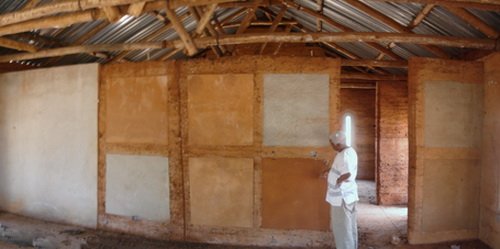Let’s Build With Earth Zimbabwe
EBUKI are partners in the exciting Let’s Build With Earth Zimbabwe project, bringing our skills and network to help achieve the project aims - a rebirth of earth in construction.
Project Lead: Rowland Keable
2020-ongoing, UK and Zimbabwe
For lots more images and information, join the Facebook group here.
Let’s Build With Earth Zimbabwe (LBWEZ) grew out of Zimbabwe's earth building culture, its innovation in standards, its need for affordable low emission building materials and its international connections.
Teaching the next generation of professionals at NUST
Starting with discussions between NUST, local professionals and Ebuki, LBWEZW wrote MoU's in 2019 and initiated the first meetings and presentations with a range of local private, government, NGO and academic stakeholders. It also began the first formal teaching sessions in earth structures.
Thousands of air dried bricks could reduce costs and emissions
A quick survey of the production, contracting, design and education available showed switching to low carbon technologies could be achieved quickly and at low cost.
Inspecting 25 year old clay plaster test panels at SIRDC
A small team has been designing strategies to move the project forward, design competitions, surveying existing structures, networking with practitioners, producers and encouraging stakeholders have all begun.
Rammed earth suburbs exist in many cities and after 80 years some need a little maintenance
The next visit by Ebuki was scheduled for September 2020 but has been postponed until September 2021. The potential for this to be replicated in many countries in the region is a continuing factor in how the project is planned and executed.
EBUKI remain a committed and active partner.
The Let’s Build With Earth ZW Facebook page is the place to go for engagement with this project.
Relevant EBUKI links
This takes the JUMP Project and PIRATE project work out further afield.
-
Traditional earth materials in Zimbabwe have become unfashionable; more destructive materials using concrete and fired bricks have become favoured.
-
Influencing cross-sector to increase advocation of earthen materials for construction in Zimbabwe
-
Funding from Tudor Trust.
Local funding is becoming available.
-
Visit to Zimbabwe to facilitate discussions amongst local officials, industry players, educational institutions, local people.
Training for Trainers at University, vocational and building sites
-
Reports to show what progress has been made.
-
Shift in the attitude towards traditional earth materials.
Reduced carbon emissions from brick manufacturers, change in byelaws, earth building curriculum in universities and vocational training.
-
Contracts awarded to suppliers using earth materials, legislation changed, course content changed.







